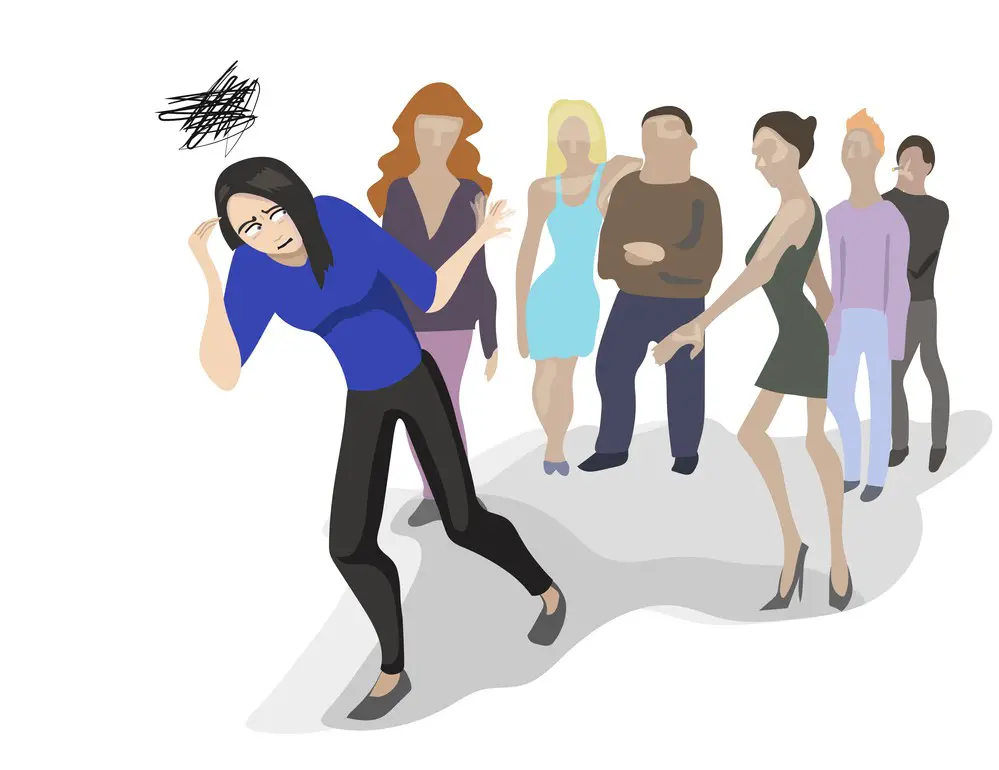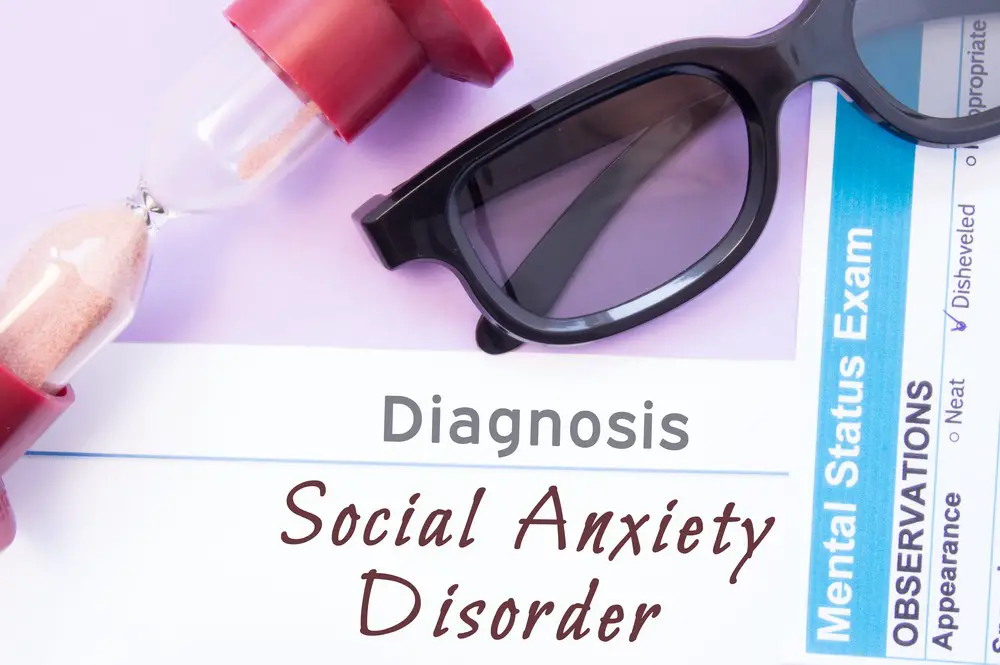As a BetterHelp affiliate, we receive compensation from BetterHelp if you purchase products or services through the links provided
Do you feel like you constantly struggle with anxiety in social situations? Or maybe it’s more than just feeling uncomfortable – do your fears keep you from engaging with people or trying new things? Understanding the difference between social anxiety and avoidant personality disorder might be helpful. Social anxiety vs. avoidant personality disorder is an important distinction that can help guide treatment options and coping strategies. This blog post will explore what sets these two mental health conditions apart and discuss available treatments and ways to cope.
Table of Contents:
What is Social Anxiety?
Social anxiety disorder (SAD) is a type of anxiety disorder characterized by intense fear or avoidance of social situations. People with SAD may experience extreme discomfort when interacting with others, worrying that they will be judged negatively or embarrassed in some way. This fear can lead to physical symptoms such as sweating, trembling, and blushing.
People with SAD often feel like they are being watched and judged by others, even when there is no real reason for this feeling. They may also worry about saying the wrong thing or making mistakes during conversations, leading them to avoid social interactions altogether.
The exact cause of SAD is unknown, but it’s believed to be related to genetics, environmental factors, and brain chemistry. It’s thought that people who have experienced traumatic events in their life may be more likely to develop SAD than those who haven’t had any significant traumas. Additionally, individuals with family members with the condition are at higher risk of developing it.
Common symptoms of SAD include difficulty making eye contact during conversations; avoiding speaking up in group settings; having trouble forming relationships; feeling extremely anxious before attending social gatherings; experiencing physical symptoms such as sweating or trembling when around other people; and believing that everyone else is better than you socially or intellectually.
Social anxiety is a common and treatable condition, but it’s essential to understand the differences between it and Avoidant Personality Disorder to find the right help. Let’s take a look at what Avoidant Personality Disorder is next.
What is Avoidant Personality Disorder?
Avoidant Personality Disorder (APD) is a mental health condition characterized by extreme shyness, inadequacy, and avoidance of social situations due to fear of rejection (as one therapist put it, “shyness on steroids”). People with APD may have difficulty forming relationships and often feel isolated. They may also be overly sensitive to criticism or disapproval from others.
People with APD experience intense anxiety in social situations such as parties, meetings, or job interviews. This can lead them to avoid these types of activities altogether. They may also find it challenging to make friends or form romantic relationships due to their fear of being judged or rejected by others.
For someone to be diagnosed with APD, they must meet specific criteria outlined in the Diagnostic and Statistical Manual of Mental Disorders (DSM-5). These include:
• Feeling inadequate and inferior compared to other people;
• Excessive sensitivity towards criticism;
• Extremely low self-esteem;
• Avoiding activities that involve interpersonal contact out of fear;
For someone to be diagnosed with APD, they must meet specific criteria outlined in the Diagnostic and Statistical Manual of Mental Disorders (DSM-5). These include feeling inadequate and inferior compared to other people, excessive sensitivity towards criticism, extremely low self-esteem, avoiding activities that involve interpersonal contact out of fear, difficulty forming close relationships even when desired, anxiety about meeting new people because they think they will be disliked or rejected, preoccupation with being criticized or rejected in social settings, and unwillingness to take risks due to fear failure leading them into isolation.
Individuals who suffer from this disorder usually recognize that their behavior is irrational but cannot change it without professional help. Treatment options for those suffering from APD include cognitive behavioral therapy (CBT), psychotherapy, medications such as antidepressants, and support groups where individuals can share experiences and learn coping strategies.
Although Avoidant Personality Disorder can be challenging to manage, understanding the differences between it and Social Anxiety can help you better manage your symptoms. Let’s now explore the differences between Social Anxiety and Avoidant Personality Disorder.
Differences between Social Anxiety and Avoidant Personality Disorder
Social anxiety and avoidant personality disorder (APD) are two different mental health conditions that share some similarities. Both involve a fear of social situations, but the severity and type of symptoms vary between the two disorders.
Social anxiety is characterized by intense fear or dread of being judged negatively in social settings. People with this condition may feel embarrassed or humiliated when interacting with others, leading to feelings of extreme self-consciousness and distress. Symptoms can include blushing, sweating, trembling, nausea, difficulty speaking or making eye contact, and avoiding social situations altogether. Social anxiety typically does not interfere significantly with daily functioning; however, it can be debilitating if left untreated.
An avoidant personality disorder is more severe than social anxiety disorder in terms of its impact on daily activities. People with APD experience significant levels of distress when faced with unfamiliar people or new situations due to their fear of rejection or criticism from others. They may also have low self-esteem and a sense of inadequacy, and difficulty forming relationships due to their avoidance behaviors, such as isolating themselves from other people or refusing invitations to events they perceive as risky for them socially. The person’s ability to work productively may be impaired due to these issues, often leading to depression if not treated properly.
The treatment options for both conditions differ slightly depending on the severity and individual needs involved. Cognitive Behavioral Therapy (CBT) has been effective in treating both conditions. At the same time, medication might be necessary for those suffering from APD who do not respond positively enough after trying CBT alone first. Additionally, various coping strategies available could help reduce stress levels, such as relaxation techniques like deep breathing exercises, mindfulness meditation, yoga, and journaling.
Understanding the differences between social anxiety and avoidant personality disorder is essential to choose the best treatment option. In the next section, we will discuss some of these options and how they can help.
Treatment Options for Social Anxiety and Avoidant Personality Disorder
While both disorders share some common symptoms, they also have distinct differences that require specialized treatment approaches. Fortunately, various therapeutic options are available to help people manage their symptoms and lead healthier lives.
Cognitive-Behavioral Therapy (CBT): CBT is a type of psychotherapy used to treat social anxiety and avoidant personality disorder. It focuses on helping the individual identify negative thought patterns and behaviors associated with their condition and teaching them coping skills for managing stressors in daily life. During therapy sessions, the therapist will work with the patient to develop an action plan for dealing with anxious thoughts or situations that may trigger avoidance behavior.
Psychotherapy: Psychotherapy is another talk therapy used to treat social anxiety and avoidant personality disorder. This approach involves working one-on-one with a trained therapist who helps the individual explore underlying issues related to their condition, such as past trauma or low self-esteem. This type of therapy aims to gain insight into how these experiences shape current feelings and behaviors so that new coping strategies can be developed over time.
Treatment options for social anxiety and avoidant personality disorder can help those struggling with these conditions to find relief. Still, it is essential to understand the strategies needed to cope with them. The following section will explore coping strategies for managing social anxiety and avoidant personality disorder.
Coping Strategies for Social Anxiety and Avoidant Personality Disorder
It is important to remember that strategies are available for managing these symptoms in everyday life.
Deep Breathing Exercises: Deep breathing exercises can help reduce stress and increase relaxation. Taking slow, deep breaths helps the body relax and reduces muscle tension. This can be done anywhere at any time, making it easy to manage symptoms of social anxiety or avoidant personality disorder when they arise.
Mindfulness Techniques: Mindfulness techniques involve focusing on being present at the moment without judgement or criticism of oneself or others. Practicing mindfulness can help bring awareness to one’s thoughts and feelings which may lead to a better understanding of why certain behaviors occur and how best to cope with them.
Positive Self-Talk: Positive self-talk involves talking positively about yourself rather than negatively judging your behavior or actions during stressful situations. This type of positive reinforcement helps build confidence and encourages healthy coping skills when faced with difficult circumstances, such as social anxiety or avoidant personality disorder.
Seeking support from friends or family members is another great way to manage social anxiety or avoidant personality disorder symptoms. Having someone who understands what you are going through can provide comfort and reassurance that you are not alone in dealing with these issues, which may make it easier for you to take steps toward managing your condition more effectively over time.
By exploring the coping strategies for social anxiety and avoidant personality disorder, you can find ways to manage your symptoms and regain control of your life. The next step is to explore the available resources to help support your healing journey.
Online Therapy
Online therapy has become increasingly popular as more people seek mental health services from the comfort of their homes.
It can be an excellent choice for those with social anxiety or avoidant personality disorder, who may find it difficult to attend traditional face-to-face sessions.
Pros and Cons
The pros of online therapy include convenience, cost savings, and privacy. With online therapy, you don’t have to worry about traveling to a therapist’s office or taking time off work for appointments.
You also save money on transportation costs and don’t have to pay extra fees associated with seeing a therapist in person.
Finally, there is often greater anonymity when using online platforms, which can benefit those dealing with social anxiety or other issues related to the stigma around mental health treatment.
On the other hand, some potential drawbacks of online therapy should be considered before beginning treatment.
For example, without seeing your therapist in person, it can be harder to build rapport and trust during sessions; this could make it more difficult for clients struggling with certain disorders, such as avoidant personality disorder, where establishing relationships is already challenging enough.
Additionally, if technology fails during a session due to poor internet connection or technical difficulties, progress could be hindered until these issues are resolved.
Different Providers
When considering different providers of online therapy services, you must first research them to know what kind of service they offer and how experienced they are in treating your particular condition(s).
Some companies specialize solely in providing teletherapy, while others offer virtual and face-to-face counseling options; make sure you choose one that best meets your needs!
Additionally, look into reviews from past clients (if available) to get an idea of what type of experience they had working with the provider before committing yourself financially or emotionally too deeply to any one option yet!
BetterHelp
BetterHelp is one example of an excellent provider offering comprehensive teletherapy services at affordable prices across many countries worldwide – including Canada & USA – making them accessible no matter where someone lives, geographically speaking!
They employ highly qualified therapists who specialize in various areas such as depression & anxiety management and relationship counseling, amongst many other topics related directly towards helping individuals cope better within their day-to-day lives despite whatever challenges life throws at them!
Read their reviews before making a decision.
Resources
Resources for Social Anxiety and Avoidant Personality Disorder can be found in various places. The first step is to reach out to your primary care physician or mental health provider for an evaluation and referral to the appropriate resources.
Online Resources: There are many online resources available that provide information about social anxiety and avoidant personality disorder, including support groups, blogs, forums, websites, and other online tools. Some examples include the National Alliance on Mental Illness (NAMI), Anxiety UK, Mindful Self-Compassion (MSC), and Social Anxiety Institute (SAI). These organizations offer helpful advice on managing symptoms and connecting individuals with local support groups or providers specializing in treating these conditions.
Books: Books can also be an excellent resource for understanding social anxiety and avoidant personality disorder. Popular titles include “The Shyness & Social Anxiety Workbook” by Martin M Antony & Richard P Swinson; “The Cognitive Behavioral Workbook for Anxiety” by William J Knaus; “Living With It: A Survivor’s Guide To Panic Attacks” by Claire Weekes; “Anxiety Free: Unravel Your Fears Before They Unravel You” by Robert L Leahy; and “Coping With Social Anxiety: A Recovery Guide For Sufferers And Their Families” by Gillian Butler & Tony Hope.
Therapy/Counseling Services: Professional counseling services are another great option if you need help managing your symptoms of social anxiety or avoidant personality disorder. Licensed therapists have experience working with people who suffer from these conditions, so they understand how best to treat them effectively. Additionally, some insurance plans may cover therapy sessions, so check with your provider before scheduling an appointment.
Joining a support group or peer network can also be beneficial if you’re struggling with either condition. It allows you to connect with others who understand what you’re going through, providing emotional comfort during difficult times. Local community centers often host free support groups. At the same time, several national organizations, such as NAMI, offer virtual and in-person meetings, depending on where you live.
FAQs
Is avoidant personality disorder and social anxiety disorder the same?
No, avoidant personality disorder and social anxiety disorder are not the same. An avoidant personality disorder is a long-term behavior pattern characterized by extreme shyness, fear of criticism or rejection, and avoidance of social situations. Social anxiety disorder is an intense fear or discomfort in social settings that can interfere with daily activities. Both conditions may have similar symptoms but distinct mental health disorders.
Is avoidant personality disorder worse than social anxiety?
No, an avoidant personality disorder is not necessarily worse than social anxiety. An avoidant personality disorder is a more pervasive and chronic form of anxiety that can lead to extreme avoidance of social situations and activities. On the other hand, social anxiety is an intense fear or discomfort in certain social situations that can be managed with therapy and lifestyle changes. Both conditions are treatable but require different approaches depending on their severity.
Can you have an avoidant personality disorder and social anxiety disorder?
It is possible to have both an avoidant personality disorder and social anxiety disorder. An avoidant personality disorder is characterized by inadequacy, extreme sensitivity to criticism, and a fear of rejection or disapproval. Social anxiety disorder involves an intense fear of being judged or embarrassed in social situations, leading to avoidance behaviors. Both diseases can cause significant distress and interfere with everyday life activities. Treatment for both conditions typically includes cognitive-behavioral therapy and medication if needed.
What disorder is similar to social anxiety disorder?
Generalized Anxiety Disorder (GAD) is similar to social anxiety disorder. It involves excessive and persistent worry about everyday life events, such as work or school performance, family issues, health concerns, and money. People with GAD often experience physical symptoms such as fatigue, headaches, muscle tension, restlessness, or difficulty concentrating. They may also have trouble sleeping due to worrying too much. Treatment for GAD typically includes psychotherapy and medication to help reduce the intensity of symptoms and improve quality of life.
Conclusion
It is essential to understand the differences between social anxiety and avoidant personality disorder and the treatment options available for each. While both conditions can be challenging to manage, many strategies can help you cope with your symptoms. Proper diagnosis and treatment make it possible to lead a more fulfilling life despite having either of these conditions. Understanding the difference between social anxiety vs avoidant personality disorder will help you make informed decisions about your care and well-being.
Do you struggle with social anxiety or avoidant personality disorder? You don’t have to go through it alone. Many resources are available to help manage your symptoms and improve your quality of life. Rest Equation provides advice for stress relief, information about the therapy, and other tools that can be used to find a healthier balance between being comfortable around people and avoiding situations that cause distress. Take control of your mental health today – visit RestEquation now!
Also Read
How Do Social Anxiety and Introversion Compare?

- 5 Helpful Ideas for Managing Stress During a Plumbing Emergency - April 24, 2025
- Buying a Franchise Without Losing Your Mind - April 24, 2025
- 3 Ways Wearing a Hat Can Help Lower Your Stress Levels - April 19, 2025
This site contains affiliate links to products. We will receive a commission for purchases made through these links.







